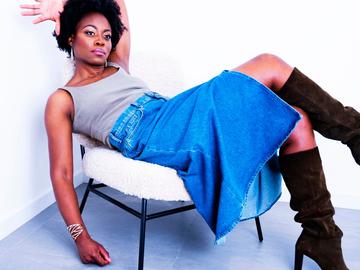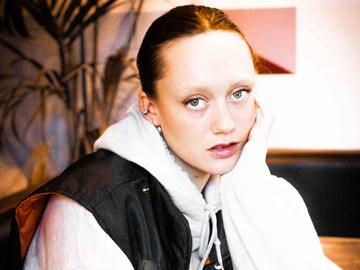Whether he is roaming the Foire du Midi, putting up an exhibition at a miniature golf course, or gathering raw tales in the city's underbelly, no photographer has left a larger, more playful and profound mark on Brussels than Vincen Beeckman. “Photography is simply life.”
© Sophie Soukias
Also read: A cowboy without a horizon: Vincen Beeckman & Kasper Demeulemeester map the American dream
VINCEN BEECKMAN
Born in Brussels in 1973
Studies journalism at IHECS
Travels the world, but returns to Brussels, co-founds the Blow Up collective and becomes photography curator and community projects organiser at Recyclart
Develops long-term socially engaged projects in which he combines his own photographs with other media, images from archives or disposable cameras he hands out
Is constantly on the look-out for original ways to approach and show photography (the Fuseum of Motography, the Lokal Fototek Foundation)
“I've already been asked to photograph bands and make images of people I don't know, and very occasionally I have done that too. But in reality, I have no choice but to refuse jobs like that, or say that maybe in three years, when some time has passed and I've gotten to know the people myself, it might work. Well, that's out of the question, of course. (Laughs) No, I always feel like I'm wasting time when committing to something like that. I'd rather spend another two hours in the nursing home or visit the homeless at Brussels Central.”
Vincen Beeckman says it with a smile, on the terrasse of a café just above Anneessens tram station, where Casting, his first photo project from 2004, was installed on a series of columns in 2007. When we stroll through the station a little later, he recalls warm memories of that moment. How the local residents in those photos created cheerful chaos there on the platforms, looking for fragments from their interiors, for people they knew, for themselves...
Spectacular events, the things that dominate the news, like now the hunger strikers in the Beguinage Church, put me at a distance. I am driven by the little things that happen all the time and everywhere
There are those who have since then lost themselves, fallen out of life. It happens, it is inherent in human beings, and it is perhaps even more inherent in the people who often appear in Vincen Beeckman's images. Vulnerable people, wrapping tragic lives around their souls. People who become displaced, end up on the street, get lost in the raw margins of society and the frayed edges of themselves. “That is why my projects take so long. Moreover, projects like that have no end, not even after an exhibition or the publication of a book. Today there are about fifteen places where I see and photograph people at regular intervals, and I have been doing that for years. There is always a core of 'main characters' and then there are people around them coming and going. There are of course periods when I see them a little less, but that's just a break. Or to take a step back, to escape from the engaged work every now and then and develop more playful projects.” Projects such as his current show at Wolu Mini Golf, La Pêche aux Canards Belge in Arles in 2019, his infamous Fuseum of Motography or the Lokal Fototek Foundation (with Kasper Demeulemeester), all ways to invite people to approach the medium of photography differently, away from the sanctuary of the white cube. “But those ties with my people, my 'characters' is unbreakable. We share a history.”
KEEP YOU CLOSE
Proximity. That is perhaps the word that best describes the practice of Vincen Beeckman, who still cherishes his eighteen years as photography curator and community projects organiser at Recyclart. “It was my task to meet people from the neighbourhood and arrange projects with them. The freedom I had when doing that and the time frame I was given for those projects made it possible to build more and more interesting things. Like I was given an eighteen-year residency as a gift.”
_Sophie Soukias.jpg?style=W3sicmVzaXplIjp7ImZpdCI6Imluc2lkZSIsIndpZHRoIjozNTAsImhlaWdodCI6bnVsbCwid2l0aG91dEVubGFyZ2VtZW50Ijp0cnVlfX0seyJqcGVnIjp7InF1YWxpdHkiOjk1fX1d&sign=721585d74fbe5c97b64ea724a1f0553ba55a426c782814920c0f28c2757445f4)
© Sophie Soukias
| Hunter-gatherer of images, stories and encounters Vincen Beeckman at the Foire du Midi.
“I've been lucky every time to find someone in my path who could convince me to dive into the deep end, try things out. But I did also fight for that kind of luck.” His journalism studies at IHECS took him around the world, “but all those people I met, I could never meet again. I couldn't build anything with them, so it made no sense to me.”
“The photo is always an alibi,” explains Vincen Beeckman. It is a way to set up a meeting, get closer. “I mostly watch, I don't speak much,” he laughs. “I'm not a party animal or a leader, in a group you'll always find me somewhere at the back. My projects also invariably revolve around one or two people that my gaze gets stuck on. I try never to ask direct questions, I just talk. Why someone is homeless, what disability they have, that doesn't interest me much. For me, what matters is the visual, what we do together, our relationship. Spectacular events, the things that dominate the news, like now the hunger strikers in the Beguinage Church, put me at a distance. I am driven by the little things that happen all the time and everywhere. Like in that family in Mons, that I've been visiting for seven years now, and where I'm the only constant in a life of divorces, loves, deaths, old and new pets... That's how events grow into rituals.”
POLYPHONY
“But that takes some effort. My way of working is not to wait for an assignment, it is to pick up the contact and maintain it, occasionally visiting for a couple of hours, not to push, but to look for reciprocity in the relationship. Only when that link, that joint project, is there, when my voice is not the only one – which is why I hand out disposable cameras and integrate drawings, texts, archive images and other media in my work – does honest, beautiful work emerge. After a few years, something beautiful might crystallise out of those moments.”
Photography is not thinking too much, not chasing complexity, it’s just starting from that one super-simple point of that relationship with someone else and looking for a balance where you both feel good. Photography is simply life
Something that goes beyond the purely documentary and allows for a glorious stratification to seep into that one image, where what you see expands into what you feel and imagine. “It's not thinking too much, not chasing complexity, it's just starting from that one super-simple point of that relationship with someone else and looking for a balance where you both feel good. Photography is simply life.”
ARTS 20+1
> 31/10, Wolu Mini Golf, www.wolubilis.be
BXL UNIVERSEL II: MULTIPLI.CITY
> 12/9, Centrale for Contemporary Art, centrale.brussels
VINCEN BEECKMAN
www.vincenbeeckman.com / Instagram: @beeckmanvincen
Read more about: Expo , Vincen Beeckman , Under the skin



_Heleen_Rodiers.jpg?style=W3sianBlZyI6eyJxdWFsaXR5Ijo3NX19LHsicmVzaXplIjp7ImZpdCI6ImNvdmVyIiwid2lkdGgiOjM2MCwiaGVpZ2h0IjoyNzAsImdyYXZpdHkiOiJjZW50ZXIiLCJ3aXRob3V0RW5sYXJnZW1lbnQiOnRydWV9fV0=&sign=fc1814b9afa51d3765a97cac67c6dc92ba38bc7c4bd1c853d8e421424e6d8b45)